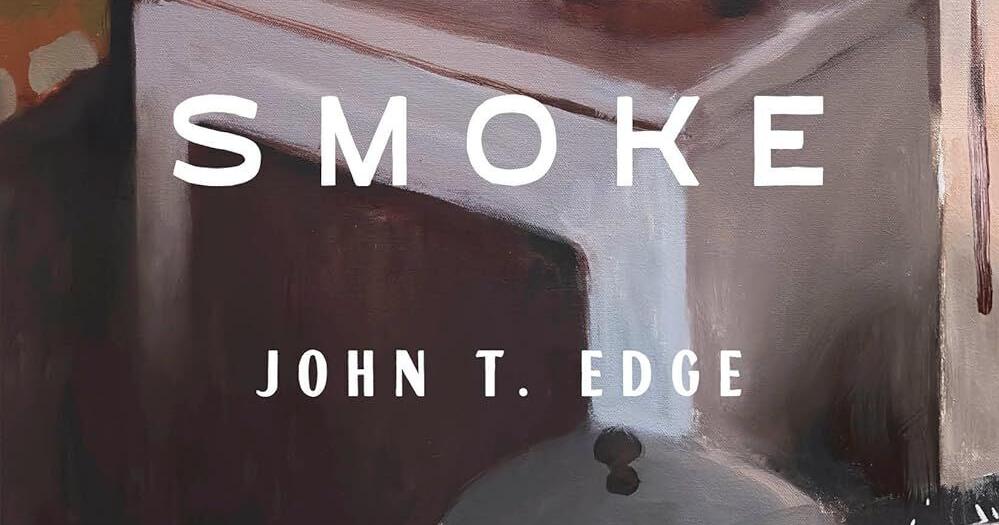Copyright Charleston Post and Courier

HOUSE OF SMOKE: A Southerner Goes Searching for Home. By John T. Edge. Crown. 272 pages. $30. “In my beginning is my end” — the opening line of T.S. Eliot’s “East Coker” — initiates one of the great meditations on the cyclical interplay of past, present and future in the context of the writer’s return to his origins. Later, and in the American South, a character in William Faulkner’s “Requiem for a Nun” acknowledges the same dynamic. “The past is never dead,” he says, “it’s not even past.” John T. Edge is a Southerner and, like Faulkner, a resident of Oxford, Miss. Edge has long been a leader in what is known as The Southern Revival — a national interest in Southern culture and southern food — and has been the champion of food culture as a legitimate means of understanding the region’s past, present and future. Edge returns to his place of origin and evaluates his own history in “House of Smoke,” a memoir in which he candidly and often courageously confronts the stories that have shaped him and his career. Edge grew up in Clinton, Ga., in a home that was the birthplace of Confederate General Alfred Iverson. Beginning with his childhood in what might be called the Transitional South of the 1960s and 1970s, Edge describes a worldview that was pulled both backward and forward, reverent of the past, but yearning for something redemptive. “Born into a Confederate terrarium” as he puts it, he was nevertheless conditioned to “think in new ways.” Clinton was conducive to this process — a rural but aspirational middle-Georgia town, within easy reach of Atlanta’s shopping malls, that nevertheless remained traditional and was defined by a characteristically Southern sense of loss that fueled the milieu in which Edge grew up. Edge’s mother Beverly was his world’s primary storyteller and mythmaker. Charming and mercurial, Beverly wove for her son a vision of past and place with threads from often disparate sources — her own heritage, the Iverson House and its region, an acquisitive need for symbolic meaning, and a defiance of what she saw as the gauche style and conventional views of their community. No wonder that there were three pieces of artwork, all chosen by Beverly, in Edge’s childhood bedroom: two color prints of Confederate generals and a poster with text from Thoreau’s “Walden” about marching to the beat of a different drummer. But there was a dark side. Beverly drank, feigned attempts at suicide and at least once was physically abusive to her son. Home became a place of insecurity and trauma for the Edge family in the 1970s. A friend killed himself with a gun belonging to Edge’s father, in Edge’s parents’ bedroom, and an extended and unprosecuted series of violent break-ins by a neighbor created what Edge’s father called “The Siege.” When Edge left home for the University of Georgia in the early 1980s, his sense of place was as unsettled as it was rich and complex. Resolution of the ironies, uncertainties and dualities that haunted Edge began at the University of Mississippi, at which Edge earned a master’s degree and went on to play a leading role in the Southern Foodways Alliance. He became the driving force within the SFA, which champions the study of “foodways” as both a gastronomical pursuit and a vehicle for social reckoning and reconciliation, and he sanctified the organization’s mission with the rhetorical trappings of a moral crusade. Soon barbeque and butter beans became signifiers and tools in a social justice movement. SFA’s mission transcended the study and celebration of good and interesting food, it became “to drive honest conversations about slavery and its legacies” and, ultimately, “to right those wrongs.” The naïve hubris of the SFA in this period is stunning, and Edge describes it with unflinching candor. Edge believed previous scholars had misunderstood the South, and armed with a new vision, he wrote that the SFA stood for the idea that “racial chasms can be bridged … across a table piled high with bowls of collard greens and platters of cornbread.” This vision, which produced a great deal of scholarship and solid writing, also engendered an historical narrative of food-related disenfranchisement and power disparities, largely along racial lines, that would be Edge’s undoing at the SFA. In this narrative, White Southerners had no legitimate claim to food rooted largely in African American traditions, even through patronage of restaurants. “My people bought our way into those relationships,” he writes, and recounts his “‘booty call’ theory” of White culinary engagement “in which we got what we wanted, got out, and ignored the effect of our actions.” An arresting perspective, rooted in Edge’s developing story of the South, but it was a Faustian bargain for Edge and the SFA. The reckoning came in 2020, when SFA celebrated Edge’s James Beard Award for writing, and those claiming to speak for the disenfranchised came for him. Edge was accused of cultural misappropriation, of being a “white boy” who was lauded and paid for his transgressions, and of engaging in “cornbread nationalism” that ignored everything about African-Americans but their food. Edge pushed back with a restraint remarkable for someone who not only helped recognize this constituency, but had been its great champion. But when asked what his movement would suggest in the wake of George Floyd’s murder, Edge “called for a return to the table,” perhaps the most appropriate response foodways scholar could have given. His response earned condemnation, and his fall was precipitous. Despite Edge’s intellectual and organizational efforts, the past was not dead, it was not even past. Edge acknowledges near the end of the book that he was not really “making a new way” with the SFA and his vision of the South. Rather, like most people do, he was simply backfilling in the old, inherited ways. He realizes that he must return home for the “deeper work” that a good life demands. There is no hint of defensiveness in “House of Smoke.” It is a meditation, not an apologia. Edge tells a difficult story with humility and the rhetorical grace of a good writer, an even better storyteller, and an innovative thinker about the South.



